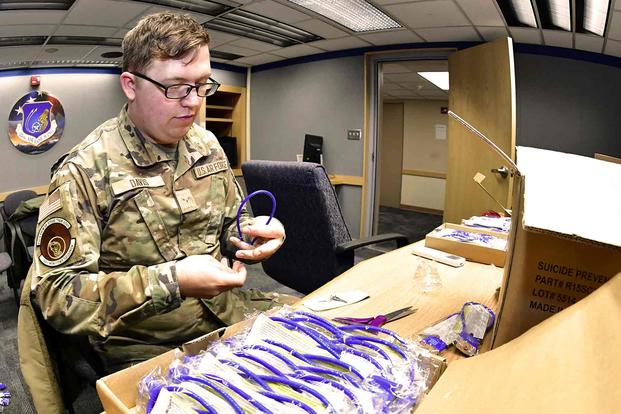A survey of U.S. veterans finds that more than half own firearms and, of those, 53% reported storing their guns unsafely, even as the departments of Defense and Veterans Affairs have invested heavily in recent years to encourage safe storage practices.
The percentage of vets who store weapons unsafely -- defined as loaded and not secured; loaded and secured; or unloaded but with ammunition available and not secured -- has declined since 2015, when the last large-scale national study found that nearly 55% of veterans reported storing their firearms in an unsafe manner.
But the authors of the research, Firearm Storage Practices Among Veterans in the United States: Findings from a Nationally Representative Survey, published online last month in the Journal of Affective Disorders, said that, given the emphasis placed on gun safety among military personnel and veterans, they were surprised by the continued, relatively high rates of unsafe storage.
Read Next: Missing Marine Corps Helicopter Found in Southern California; Search and Rescue Ongoing
"Our findings suggest that a considerable proportion of veterans continue to store their personal firearms unsafely," said Robert Pietrzak, a VA researcher and professor of psychiatry and public health at Yale School of Medicine, in an email to Military.com.
According to the survey, veterans with a history of depression or substance use were more likely to store firearms unsafely, as were those who had directly experienced a personal trauma, such an assault.
And veterans who said they likely would attempt suicide in the future were seven times more apt to report storing their firearms unsafely, according to the research.
Brandon Nichter, a researcher who serves as a visiting scientist at Yale School of Medicine and a clinical psychologist for the U.S. Special Operations Command, said that previous research indicates that most veterans own firearms for personal or household protection and want ready access -- a primary reason they may not lock them away.
But DoD and VA data show that firearms are the top method for suicide among serving and former military personnel, used in active-duty military suicides 69% of the time and in veterans' suicides 72% of the time. As a result, the departments have embraced safe-storage campaigns -- as early as 2013, when the VA and the National Guard began distributing free gun locks -- to decrease the number of suicides.
In 2021, the VA began airing public service announcements and posting billboards to encourage safe storage of firearms, and the White House announced that various federal agencies, including the VA, DoD and the Bureau of Alcohol, Tobacco, Firearms and Explosives, would coordinate their efforts to encourage safe storage.
Pietrzak said there is "clear evidence" that putting space between a person experiencing emotional distress and a firearm can reduce suicide.
Citing 2004 research conducted at Brown Medical School, Pietrzak said those who keep firearms locked or unloaded are 60% less likely to die from firearm suicide than those who store their guns unlocked and/or loaded.
Other research, he added, shows that safer storage may reduce the risk of youth suicide and unintentional deaths by firearms among children by 32%.
The Defense Department's annual suicide report for 2022 found that 492 active-duty, National Guard and reserve members died by suicide that year, down from 524 in 2021.
According to the VA, 6,392 veterans died by suicide in 2021, up 114 the previous year, while the age- and sex-adjusted rate increased by 11.6% from 2020, according to the most recently available data, after declines from 2018 to 2020.
The research published last month was based on the 2022 National Health and Resilience Study involving 2,441 veterans who represent the makeup of the veteran population in the U.S., although the respondents skewed heavily toward older white men, the researchers noted.
Another limitation to the research included response bias -- with the concept of "safe storage" subject to interpretation, according to the survey.
Pietrzak said the survey, which shows that roughly four in 10 veterans keep a loaded firearm in their homes, "underscores the importance of nationwide training initiatives to promote safe firearm storage for all service members and veterans, regardless of risk status."
The authors also recommended that health care providers both within and outside the VA receive training in speaking to patients about firearms ownership and storage practices.
"Some health care providers may not feel comfortable speaking to patients about firearm storage and often have not been trained to do so, which is important given the sensitive nature of the topic," Pietrzak said.
And they encouraged the VA and other entities to continue with safe messaging campaigns.
"Our findings highlight the vital importance of burgeoning national public health campaigns both within and outside the VA dedicated to promoting awareness about simple steps veterans can take to reduce access to lethal means and decrease suicide and violence risk for themselves and their families," they wrote.
Veterans and service members experiencing a mental health emergency can contact the Veteran Crisis Line at 988, Press 1. They also can text 838255 or chat online at VeteransCrisisLine.net.
Editor's note: This article was updated to correct the percentage of veterans who reported they stored their weapons unsafely in 2015.
Related: Promoting Safe Storage of Firearms Can Sway Service Members, Vets, Study Finds















